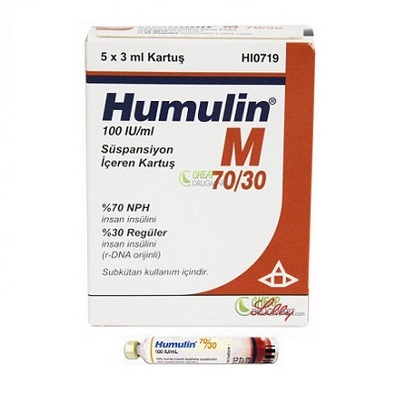
✔ 100% Authentic Product
👁️ Currently Viewing 2102
Ansulin 30/70 Vial 100IU/ml
Ansulin 30/70 Vial 100IU/ml is used for the treatment of diabetes.
Discount
Price: ৳ 394
MRP:
৳
415
5%
Off

100% Genuine Products, Guaranteed

Safe & Secure Payments, Always

Fast, Secure & Efficient Delivery

Proper Packaging
 Cash on Delivery - All over Bangladesh
Cash on Delivery - All over Bangladesh Regular Delivery - 12-24 Hours, Dhaka City* Charge Tk.39-59
Regular Delivery - 12-24 Hours, Dhaka City* Charge Tk.39-59 Regular Delivery - 24-48 Hours, Other Cities* Charge Tk.99-110
Regular Delivery - 24-48 Hours, Other Cities* Charge Tk.99-110
 ফ্রি ডেলিভারিঃ - ৯৯৯ টাকা+ অর্ডারে, ঢাকা
শহরে
ফ্রি ডেলিভারিঃ - ৯৯৯ টাকা+ অর্ডারে, ঢাকা
শহরে ফ্রি ডেলিভারিঃ - ২৯৯৯ টাকা+ অর্ডারে, ঢাকার
বাহিরে
ফ্রি ডেলিভারিঃ - ২৯৯৯ টাকা+ অর্ডারে, ঢাকার
বাহিরে
100% Genuine Products, Guaranteed
Safe & Secure Payments, Always
Fast, Secure & Efficient Delivery
Proper Packaging
 Cash on Delivery - All over Bangladesh
Cash on Delivery - All over Bangladesh Regular Delivery - 12-24 Hours, Dhaka City* Charge Tk.39-59
Regular Delivery - 12-24 Hours, Dhaka City* Charge Tk.39-59 Regular Delivery - 24-48 Hours, Other Cities* Charge Tk.99-110
Regular Delivery - 24-48 Hours, Other Cities* Charge Tk.99-110 ফ্রি ডেলিভারিঃ - ৯৯৯ টাকা+ অর্ডারে, ঢাকা
শহরে
ফ্রি ডেলিভারিঃ - ৯৯৯ টাকা+ অর্ডারে, ঢাকা
শহরে ফ্রি ডেলিভারিঃ - ২৯৯৯ টাকা+ অর্ডারে, ঢাকার
বাহিরে
ফ্রি ডেলিভারিঃ - ২৯৯৯ টাকা+ অর্ডারে, ঢাকার
বাহিরে
✅ Description:
- Ansulin 30/70 Vial 100IU/ml is a combination of two insulin types: human insulin (short-acting) and insulin isophane (intermediate-acting).
- The medication helps suppress sugar production in the liver and enhances the uptake of sugar in fat and muscle cells. This leads to effective and consistent blood sugar control.
- It's recommended to take the medication as prescribed by a doctor. If self-administration is not feasible, a healthcare professional should administer it.
- Possible side effects include allergic reactions at the injection site, low blood glucose (hypoglycemia), itching, skin changes at the injection site, swelling, rashes, and weight gain. Most side effects resolve over time, but persistent ones should be discussed with a doctor.
Safety Advices

Alcohol
UNSAFE
It's considered unsafe to consume alcohol while using Ansulin 30/70 Vial 10IU/ml.

Pregnancy
SAFE IF PRESCRIBED
Using Ansulin 30/70 Vial 10IU/ml during pregnancy is generally considered safe, as animal studies show limited adverse effects on the developing baby. However, there are limited human studies, so caution is advised.

Breastfeeding
SAFE
Ansulin 30/70 Vial 40IU/ml is considered safe to use during breastfeeding. Human studies suggest that the drug doesn't pass into breast milk significantly and isn't harmful to the baby.

Driving
CAUTION
Be cautious about driving if your blood sugar levels are too low or too high, as it can affect your ability to drive safely.

Kidney
CONSULT YOUR DOCTOR
Use Ansulin 30/70 Vial 40IU/ml with caution in patients with kidney disease. Dose adjustment may be necessary. Regular blood glucose monitoring is recommended for dose adjustments.

Liver
CAUTION
Use Ansulin 30/70 Vial 40IU/ml Cartridge 3ml with caution in patients with liver disease. Dose adjustment may be needed. Regular glucose level monitoring is advised for dose adjustments.
✔️ Uses of
✔️ How does
Insulin (Human) Regular + Insulin (Human) Isophane (pre-mixed) is a combination of two insulin preparations: Insulin Isophane and Human Insulin. Insulin Isophane has a prolonged duration of action, while human Insulin has a fast onset of action. Together, they ensure rapid and consistent sugar control by facilitating the reuptake of sugar in muscle and fat cells and suppressing the production of sugar in the liver.
✔️ Direction for use:
Here are the instructions for using HUMAN MIXTARD 30/70 40IU INJECTION:
- Injection Site: Administer the injection subcutaneously in your thighs, buttocks, upper arm, or abdomen. Do not inject into veins or muscles directly.
- Timing: Inject the medicine 30 minutes before meals.
- Meal Consumption: Consume a meal or snack with carbohydrates within 30 minutes of the injection to prevent low blood sugar.
- Preparing the Medicine: Roll the vial/cartridge between your hands until the liquid becomes uniformly white and cloudy before administration.
- Injection Process: Keep the needle under the skin for at least 6 seconds while injecting to ensure the complete dose is delivered.
- Visual Check: Prior to administration, inspect the cartridge/vial for any visible particulate matter or discoloration.
- Disposal: After use, discard the needle and syringe. Do not share needles to avoid infection transmission risk.
- Rotation of Injection Sites: Avoid repeatedly injecting in the same spot to prevent skin damage. Rotate injection sites. Consult your doctor before changing the injection site.
- Mixing with Other Insulins: Do not mix HUMAN MIXTARD 30/70 40IU INJECTION with other insulins before use.
- Consult Your Doctor: Do not stop therapy without consulting your doctor. Your correct dose and administration frequency depends on factors like age, body weight, and health condition.
Always follow these guidelines to ensure safe and effective use of the medication.
✔️ Side Effects
- Allergic reaction at the site of injection
- Hypoglycemia (low blood glucose level)
- Itching
- Lipodystrophy (skin thickening or pits at the injection site)
- Oedema (swelling)
- Rashes
- Weight gain
✔️ Quick Suggestions:
- Take the injection 15 minutes before a meal or within 20 minutes after starting a meal.
- Injecting in the abdomen's skin results in faster absorption than other areas like the upper arms, thighs, or buttocks. Do not massage the injection site after administering.
- Rotate injection sites to prevent the development of hard lumps at a single spot.
- Changing to a different type or brand of insulin should be done under medical supervision, as it might require adjusting the dosage.
- Hypoglycemia (low blood sugar) can occur when combining this medication with other antidiabetic drugs, alcohol, or by delaying/skipping a meal. Keep a sugar source for immediate relief.
- Do not share your insulin device with others, even if the needle is changed. Sharing can lead to serious infections.
- Opened vials/cartridges can be stored at room temperature for up to 4 weeks. Unopened vials must be refrigerated (2°C–8°C).
✔️ Indication
Ansulin 30/70 Vial 40IU/ml is a combination of two medicines, an intermediate-acting and a short-acting type of insulin. It is used in the treatment of diabetes mellitus (type 1 and 2) to improve blood sugar control both in adults and children. It helps maintain the blood sugar levels in diabetic patients.
✔️ Pharmacology
Insulin is a natural hormone produced by the pancreas's beta cells. In people without diabetes, it maintains a baseline level, spiking after meals. These spikes regulate the shift from post-absorptive to absorptive states. Insulin facilitates glucose uptake in muscle and fat cells, stores energy through glycogenesis, opposes energy store breakdown, promotes DNA and protein synthesis by enhancing amino acid uptake, and alters enzyme activity in glycogen synthesis and glycolysis. It's also vital for growth and supports growth hormone's effects like protein synthesis, cell division, and DNA synthesis.
Insulin's primary role is regulating glucose metabolism. It encourages glucose and amino acid uptake in most tissues, excluding the brain and liver. It has an anabolic impact by fostering glycogen, fatty acid, and protein synthesis. It inhibits liver gluconeogenesis. Insulin binds to the insulin receptor (IR), composed of extracellular alpha and transmembrane beta units. Insulin attaching to the alpha subunit spurs the beta subunit's intrinsic tyrosine kinase activity. The bound receptor auto-phosphorylates and phosphorylates intracellular substrates like insulin receptor substrates (IRS), Cbl, APS, Shc, and Gab 1. These activated proteins trigger downstream signaling molecules, including PI3 kinase and Akt. Akt influences glucose transporter 4 (GLUT4) and protein kinase C (PKC), pivotal in metabolism and catabolism.
✔️ Dosage & Administration of
Adult Dose:
Type 1 Diabetes Mellitus:
- Ketones moderate or less: 0.5 U/kg/day SC
- Ketones large: 0.7 U/kg/day SC
- Typically, 50-75% of the total daily dose is given as intermediate- or long-acting insulin
Type 2 Diabetes Mellitus:
- Initial dose: 0.5-1 units/kg/day in divided doses
- Initial dosages for type 2 diabetic patients are often lower, e.g. 0.3 to 0.6 IU/kg/day.
- Typically, 50-75% of total daily dose is given as intermediate- or long-acting insulin
- Morning: Give two-thirds of daily insulin SC
- Ratio of regular insulin to NPH insulin 1:2
- Evening: Give one-third of daily insulin SC
- Ratio of regular insulin to NPH insulin 1:1
Dosing Considerations:
- Dosage of human insulin must be based on blood and urine glucose tests and individualized for optimal effect.
- Dose adjustments should be guided by regular blood glucose testing.
- Change insulin doses in small increments: Type 1 diabetes (2 unit change); type 2 diabetes (2-4 unit change).
- Adjust to achieve appropriate glucose control.
- Hepatic impairment may require dosage reduction.
Child Dose:
- Type 1 Diabetes Mellitus:
- Ketones moderate or less: 0.5 U/kg/day SC
- Ketones large: 0.7 U/kg/day SC
Renal Dose:
- Renal impairment may necessitate dose adjustments.
Ensure that you use the appropriate syringe with the correct unit scale for insulin injections. Draw an equal amount of air into the syringe as the required insulin dose. Adhere to the instructions provided by your healthcare professional. Before injecting the insulin, gently roll the vial between your hands until the liquid appears white and cloudy. If the insulin is at room temperature, it will be easier to resuspend. Administer the insulin beneath the skin using the injection technique recommended by your doctor or nurse. Keep the needle under your skin for 6 seconds to ensure the complete delivery of the dose.
✔️ Missed Dose:
- A missed dose might result in high blood sugar levels
- Symptoms may include excessive thirst, frequent urination, loss of appetite, drowsiness, and fruity breath odor
- If you missed a dose, take it as soon as you remember
- If close to the next dose, skip the missed dose and continue with regular dosing schedule
✔️ Overdose:
- An excess of Human Mixtard 30/70 injection can lead to low blood sugar levels (hypoglycemia)
- Symptoms may include dizziness, fainting, sweating, and tremors
- If you have a blood glucometer, test and confirm blood glucose levels
- Regardless of testing, take glucose water, juice, or consume sugar/chocolates
- Seek medical help promptly
✔️ Interaction
Drug-Drug Interactions:
Before using HUMAN MIXTARD 30/70 40IU INJECTION, inform your doctor if you are taking any of the following medicines:
- Other diabetes medicines such as sulfonylureas (e.g., tolbutamide, glibenclamide, glipizide), biguanides (e.g., metformin, phenformin), thiazolidinediones (e.g., pioglitazone), DPP-4 inhibitors (e.g., sitagliptin, vildagliptin), or SGLT-2 inhibitors (e.g., remogliflozin)
- Medicines for depression like monoamine oxidase inhibitors (e.g., rasagiline, selegiline, phenelzine)
- Medicines for high blood pressure and heart problems like beta-blockers (e.g., propranolol, atenolol, nebivolol) or ACE inhibitors (e.g., captopril, enalapril, lisinopril)
- Salicylates (pain or fever relievers) like aspirin
- Anabolic steroids (muscle-building drugs) like testosterone, nandrolone, oxandrolone
- Sulfonamide antibiotics (bacterial infection treatments) like sulfasalazine, sulfadiazine, sulfamethoxazole
- Oral contraceptives (birth control pills) like mifepristone
- Thiazide diuretics (increase urine output, reduce blood pressure) like chlorothiazide, hydrochlorothiazide
- Glucocorticoids (anti-inflammatory drugs) like cortisone,
- Glucocorticoids (anti-inflammatory drugs) like cortisone, betamethasone, dexamethasone
- Thyroid hormones (treat thyroid disorders) like thyroxine, triiodothyronine
- Sympathomimetic agents (asthma or circulatory disorder treatments) like ephedrine, adrenaline, salbutamol, terbutaline
- Growth hormone (promotes growth in the body)
- Danazol (treats endometriosis)
- Octreotide (treats diarrhea)
- Lanreotide (treats abnormal body growth)
Interaction with Food or Drink:
Administer HUMAN MIXTARD 30/70 40IU INJECTION 30 minutes before a meal.
✔️ Contraindications
Contraindications of Human Mixtard 30/70 injection include:
- Allergy: If you are allergic to insulin or any other ingredients present in the injection.
- Hypoglycemia: If you have low blood sugar levels (hypoglycemia).
✔️ Pregnancy & Lactation
During pregnancy, Human Mixtard 30/70 injection may be used if recommended by your doctor. It's important to closely monitor your blood sugar levels because the dose requirements may change with each trimester of pregnancy.
Similarly, Human Mixtard 30/70 injection is considered safe during breastfeeding. You can use it while nursing your infant without significant risk. Always follow your doctor's guidance and maintain proper blood sugar control during this time.
✔️ Precautions & Warnings
Avoid taking HUMAN INSULIN+INSULIN ISOPHANE if you have any allergies to its components. If you experience hypoglycemia (low blood sugar levels), have low potassium levels (hypokalemia), or have heart, kidney, or liver issues, inform your doctor before using this medication. Pregnant or breastfeeding individuals should consult their doctor before using HUMAN INSULIN+INSULIN ISOPHANE. Be cautious if you experience dizziness while taking it, and only drive if you are fully alert. Refrain from consuming alcohol while on this medication to avoid undesirable effects. When traveling across more than 2 time zones, your doctor may need to adjust your insulin schedule, so seek their guidance.
✔️ Storage Conditions
- Opened vials stay good at room temperature for up to 4 weeks, while unopened vials must be placed in the refrigerator (2°C–8°C).
⚠️Disclaimer:
At ePharma, we’re committed to providing accurate and accessible health information. However, all content is intended for informational purposes only and should not replace medical advice from a qualified physician. Please consult your healthcare provider for personalized guidance. We aim to support, not substitute, the doctor-patient relationship.











